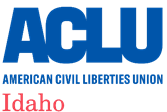ACLU to propose fair chance legislation

BOISE, Idaho (KIFI/KIDK)-After a two-year state analysis, the American Civil Liberties Union has released its "Blueprint for Smart Justice Idaho."
"The goals of the blueprint are to dramatically cut incarceration in Idaho, address racial disparities and to introduce solutions that invest in people and communities rather than in the construction of more prisons.," said ACLU of Idaho Executive Director Leo Morales. "We know these are not overnight goals, but given the high cost of incarceration to the state and our current prison overcrowding problem, we believe now is the time to start. Toward that end, we intend to lead by introducing Smart Justice legislation during the 2020 legislative session."
According to the study, incarceration in Idaho has risen 849% since 1980. The increase has out-stripped population growth and crime rates. It has cost Idaho taxpayers hundreds of millions of dollars.
ACLU blames "tough-on-crime" policies more than crime itself. It says mandatory minimum sentences, harsh sentences for minor drug and other non-violent offenses and so-called "truth-in-sentencing" laws for the massive increase.
As of June 2018, there were 8,616 people in prison in Idaho and some 3,000 to 4,000 in county jails. Another 16,000 were on probation or parole. In all, more than 360,000 Idahoans (about one in five) have criminal convictions on their records.
ACLU said its first objective is a reform initiative to advance "Fair Chance Employment" policies for Idahoans with criminal convictions.
ACLU of Idaho Policy Director Kathy Griesmyer said the ability to find a job after jail or prison is directly linked to recidivism. This is especially true for the 70-plus percent of inmates who are locked up for probation and parole violations. Without employment, many will violate again.
"More than 95 percent of inmates are released back into society," Griesmyer said. "For most of them, finding a job is key to staying out of prison, supporting their families and rebuilding their lives," she said. "But right now it's hard for many of them to get jobs because they have to check the box on the application right up front that says they have a criminal record."
ACLU will introduce the Fair Chance act to the 2020 Legislature. It would require employers to wait to ask about criminal background or do a criminal background check until the applicant is given a personal interview or conditional employment offer.
Griesmeyer said employers realize they're missing out on qualified applicants who may have made mistakes in the past.
